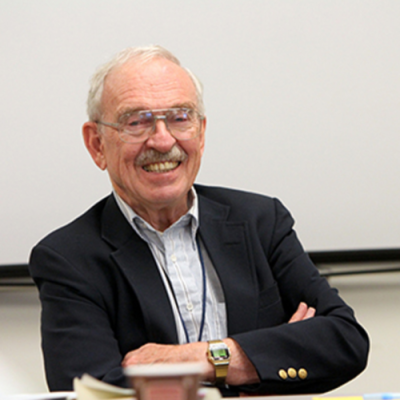White evangelicals, racism, and George Floyd: Our hour of decision

Like so many others, I have been both anguished and furious as I watched the video of a white policeman with his knee on the neck of a black man. As I told my wife, George Floyd could have been our African-American son-in-law.
But I did not think I had anything special to say. So many people like the African-American mayors of St. Paul and Atlanta and Senator Cory Booker, among many others, were saying so well what needed to be said.
But this past Sunday as I participated in my church’s Sunday School (via zoom of course), I reflected on the painful statistics that were presented. African-American men are 2.1 times more likely than white men to be shot by the police. One national poll asked people if they thought that today in most cities, the police treat blacks as fairly as whites. 47% of white respondents said yes. Only 6% of blacks said they were treated as fairly as whites by the police. Another national poll asked if the local police treat minorities more harshly than whites. Only 19% of white people said yes. 54% of blacks said yes they are treated more harshly.
Month after month, year after year, there have been new stories of white people (the police and others) killing African-Americans. We all know that African-Americans continue to experience a wide range of disadvantages. Inner city, urban (largely minority) schools spend less money per capita and have education inferior to much better funded white suburban schools. One in every three African-American men go to prison but only one in 17 white men do. In the current COVID-19 epidemic, African-Americans have been dying at twice the rate of white folk. The average white family has 13 times as much wealth as the average black family — a gap that was wider in 2015 than in 1983! Year after year, the black unemployment rate has been double that of the white unemployment rate.
We know — we have known for years! — these and many other indicators of continuing structural racism. We all know that racism is America’s original sin — a racism that has crushed African-Americans for 400 years.
But what especially grieves me as a white evangelical is the failure of white evangelicals to deal with white racism. Indeed, it’s much worse than that! White evangelicals have too often participated in, and even led, that racism.
It was white evangelical Christians in the South (helped by northerners) that passed the laws and organized the violence that effectively squelched the progress made by African-Americans in the first two decades after Lincoln’s Emancipation Proclamation in 1863. It was white evangelicals who led or tolerated thousands of lynchings for about 100 years. After the Supreme Court’s 1954 decision ending “separate but equal” school segregation, it was white evangelicals who organized segregated private “Christian” Academies so their white children would not have to go to school with black children.
When some courageous Jews and Mainline Protestants joined Dr. Martin Luther King, Jr.,’s great civil rights movement against racism, white evangelicals were at best overwhelmingly silent. When Frank Gaebelein, then coeditor of Christianity Today, moved from reporting on, to joining, Dr. King in one of his great civil rights marches, Gaebelein promptly experienced opposition and hostility from other white evangelical leaders. Jerry Falwell denounced Dr. King, condemning him for getting into politics instead of sticking to his proper role of evangelism. The seminary where I taught for 41 years was founded in 1925 as an evangelical alternative to theological liberalism. But the seminary refused to allow black male students to sleep overnight on campus and closed their swimming pool instead of integrating it. When the news of Dr. King’s assassination came to the white, evangelical Los Angeles Baptist College where Dolphus Weary (one of John Perkins’ young black proteges) was studying, Weary discovered to his horror that the white students were celebrating! In 1989, George Gallup published a survey showing that white Southern Baptists were the most likely of all Christians to object to having black neighbors.
It’s true that many white evangelical institutions have made some progress in recent decades. There have been significant statements repenting of racism — including one by the Southern Baptists.
But in 2016, a man ran for president making clear conscious appeals to white racists. He claimed — totally falsely — that President Obama had not been born in the US and was therefore not legitimately president. He did not reject support of his candidacy by white nationalists and even David Duke, the former head of the Klu Klux Klan. Paul Ryan, Republican speaker of the US House of Representatives, publicly declared that one of Trump’s statements was a “textbook” case of racism. But in spite of these clear, blatant, racist appeals, 81% of white evangelicals voted for him. And longtime Republican leader, Peter Wehner shows in his book The Death of Politics, that a major factor in the 2016 vote of white male Christians for Trump was their anxiety about losing their cultural dominance in the society.
And now in the midst of this most recent tragedy of the murder of George Floyd by a white policeman, President Trump fails to try to unite the country as previous presidents — both Republican and Democrat — have done. Instead of speaking in ways to bring Americans together, he continues to stoke racism. Instead of helping us better understand the long history of racist discrimination that fuels the angry response to Floyd’s death, he makes partisan tweets. He denounced the “very weak radical left” Democratic mayor of Minneapolis. Trump said he would send in the National Guard and added in the tweet: “When the looting starts, the shooting starts.“ That was an echo of the threat by the Miami police chief in 1967 who said he would have his police use shotguns and turn his dogs on people.
Of course looting, destroying property and throwing bricks at the police are wrong. But our leaders need to understand the source and depth of the anguish African-Americans feel with decade after decade of continuing racism. Our leaders need to praise those police who take off their helmets and dialogue with demonstrators rather than throw fire on a dangerous, tragic, explosive situation.
The man who fails to focus on uniting the nation is the president white evangelicals have elected and continue to defend. There may or may not be some valid reasons for voting for Trump (that is the subject for another time).
But unless white evangelicals rise up in large numbers to condemn Donald Trump’s racist, divisive response; unless the many prominent white evangelical leaders who vigorously support Trump’s presidency loudly and publicly condemn his failure to lead the nation away from racism; unless white evangelicals call for a sustained, vigorous campaign to finally end structural racism; unless that happens, white evangelicalism loses whatever credibility it still retains.
This is white evangelicalism’s hour of decision. We must condemn Trump’s racist actions. We must repent of our long history of racism. We must throw ourselves into a decade-long peaceful struggle to end continuing structural racism in our schools, prisons indeed all areas of society.
If Billy Graham were still with us, he would call us to respond courageously in this hour of decision.
Correction: June 7, 2020:
An earlier version of this op-ed incorrectly stated that African American men are 21 times more likely to be shot by the police as white men. It should have stated African American men are 2.1 times more likely to be shot by the police as white men.
Ronald J. Sider is president emeritus of Evangelicals for Social Action and the author of Rich Christians in an Age of Hunger. He blogs at ronsiderblog.substack.com.




























